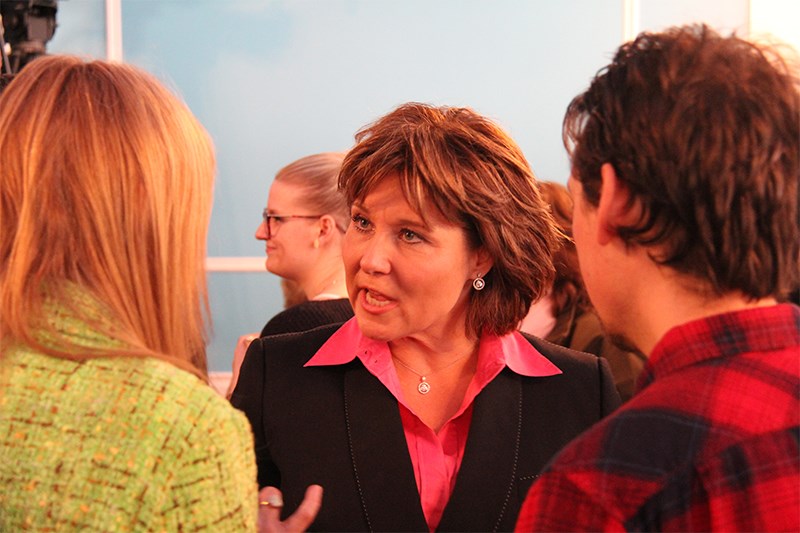Premier Christy Clark’s first visit to Powell River since taking office brought a mixed reaction from Powell River residents, for people inside the venue used for her speech, and those outside protesting.
Clark arrived at Powell River Airport on Tuesday, January 24, after flying in from Campbell River, where she had announced a new $13.5 million trades-education facility at North Island College. Clark and her entourage then made their way to Snickers Restaurant for a Powell River Chamber of Commerce meet and greet event.
Clark entered the restaurant from its back entrance on Willingdon Avenue. As the premier worked her way around the room, it was clear many of the 130 people in attendance were pleased to be able to meet her in person.
That was not the case outside though.
On the sidewalk along Marine Avenue more than two dozen protesters with signs and hand drums tried to send the premier a message that they did not support her government’s recent approval of the Kinder Morgan Trans Mountain pipeline and other controversial energy projects.
In street-performance art style, protesters staged an oil spill, complete with cardboard cutout oil tankers, ferries, sea creatures and people dressed in HazMat suits splattered in black paint.
Inside the event, chamber president Jack Barr welcomed Clark and locally elected officials, including City of Powell River councillor Maggie Hathaway (acting mayor in Dave Formosa’s absence), Powell River Regional District board chair Patrick Brabazon, Powell River-Sunshine Coast MLA Nicholas Simons and Tla’amin Nation hegus Clint Williams, who introduced the premier.
Williams took the opportunity to acknowledge the protesters outside.
“I look out and acknowledge the passion of these people who are on the streets right now,” Williams told the crowd. “Our passion is the same way for our traditional territory and the resources within it. Instead of looking at [the protesters] as a hinderance, I see them as passionate people looking to help develop this community as well.”
Clark began her speech by acknowledging the hard work and example of Tla’amin Nation and its treaty implementation.
“We are finally getting there when it comes to reconciliation,” said Clark. “We have more to do, but what we’ve seen in the last little while, there have been huge steps toward that. I really do look forward to see what you’re going to create for your community, but also the benefits of all the wealth you create and radiate throughout Powell River and the rest of the Sunshine Coast.”
Clark spent the better part of her 30-minute speech touting the province’s strong economic growth and her government’s efforts to reduce unemployment through its jobs plan.
Throughout the speech, the faint sound of car horns and people shouting from outside could be heard.
Clark told the chamber audience that as the province heads into the campaign for the upcoming May election, she is committed to small government, low taxes and using economic gains to pay for social services such as education and health care increases.
“One thing I’ve discovered after my few years as premier is that government can always figure out a way to spend more of your money, and the thing about government is they take it from you whether you want to give it to them or not,” said Clark. “We must always resist that. We must always resist the pull of growing government, making it bigger, trying to do more, when that comes at a very real cost to citizens.”
Powell River and District Teachers’ Association president Ken Holley said he was disappointed the premier did not address increasing funding for public education in next month’s budget, the result of a recent Supreme Court of Canada decision on the government’s stripping of funding over the past 15 years.
“The province has to come clean,” said Holley. “We’re not asking for back pay, just asking for them to make it right.”
The premier spoke briefly about the LafargeHolcim Texada Quarrying lockout and said she hopes workers will be able to return to work soon.
“Those are high-paying resource-industry jobs and those paycheques support a lot of people in this community,” she said
Clark mentioned how important forest and pulp and paper industries are to Powell River and the provincial economy, though she did not make any election promises about how the government would support them.
She acknowledged the province’s growing tourism industry and said a continued effort to diversify the local economy is the right direction for Powell River and BC in general.
Following her speech, Barr read some audience questions. Many focused on provincial issues, how the government had approved various projects, including the Site C Dam and the Kinder Morgan pipeline, but School District 47 superintendent of schools Jay Yule asked if there were any plans to change the way the Agricultural Land Commission (ALC) makes its decisions, so it is more responsive to local communities’ needs.
Last November the land commission ruled against an exclusion application for the development of a Sino Bright international school, which was to be a building block in a re-envisioned local economy.
Clark answered by saying her government had already made changes, making it easier for development to happen in some parts of the province where there is less development pressure on the protected land.
“While politicians may have different views about what the ALC ultimately decides, we do not interfere,” said Clark. “That independence is vitally important. I can say changes to the ALC do not happen lightly. They deserve a lot of debate and a lot of consultation because our agricultural land is really important to British Columbians.”
After Clark’s speech, Williams said he would have liked to have heard some of the Liberal’s election promises for the Powell River region.
The Wednesday, February 1, edition of the Peak features a special long-form exclusive interview with premier Christy Clark, conducted by our publisher/editor Jason Schreurs.



